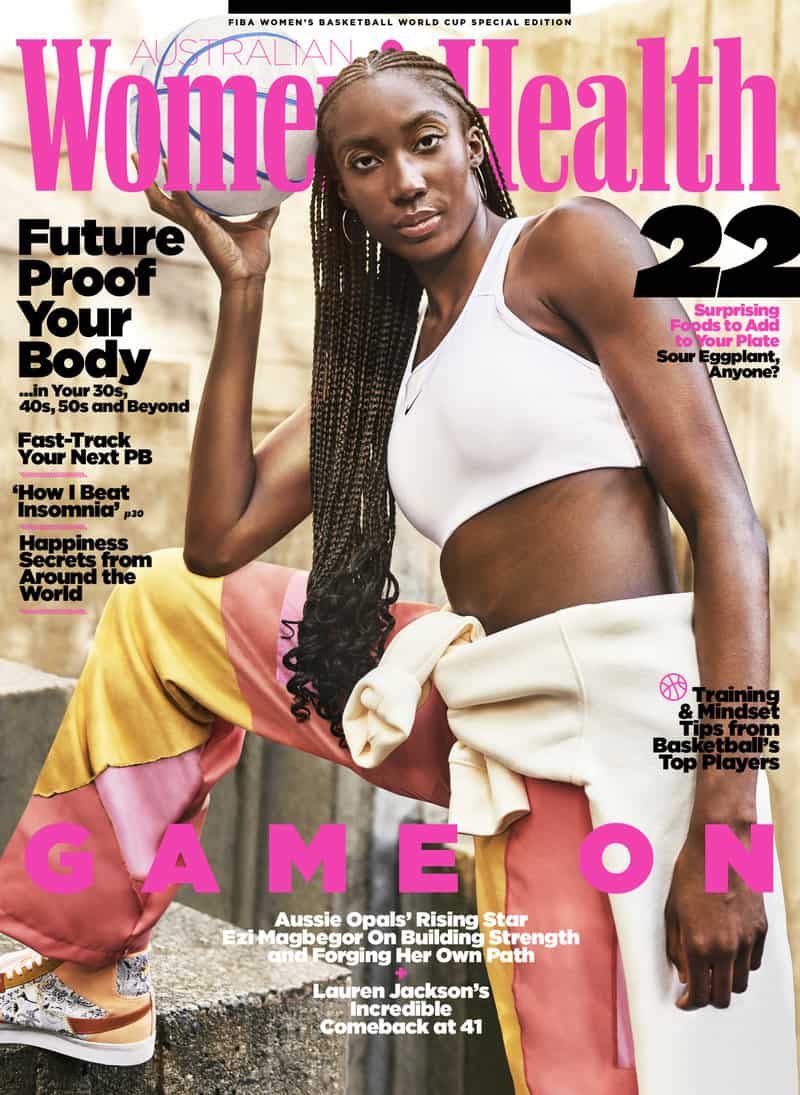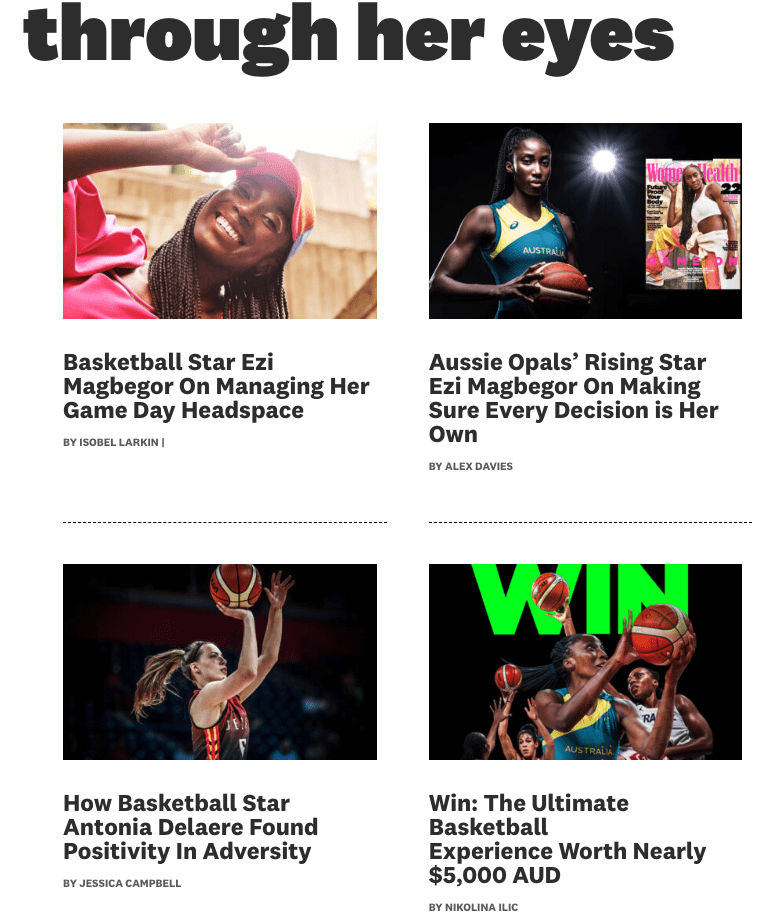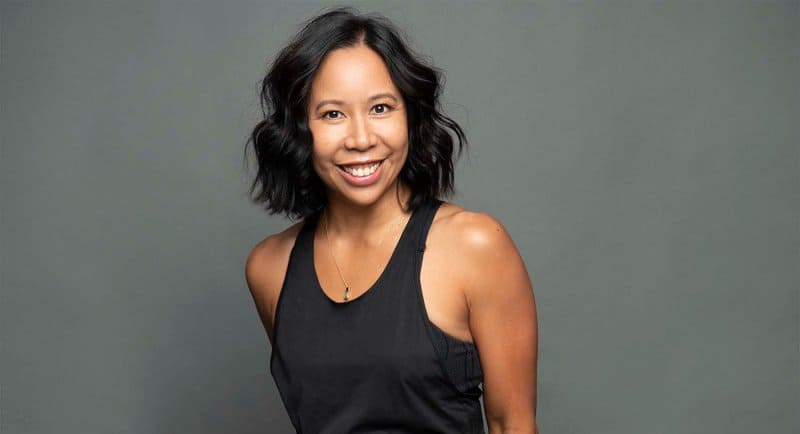Earlier this month, the October issue of Women’s Health Magazine went to shelves featuring rising star of the Australian Opals, Ezi Magbegor on the cover.
The latest issue is part of Women’s Health Australia’s partnership with the FIBA Women’s Basketball World Cup to celebrate the World Cup coming to Sydney this month.
Along with a dedicated print issue, the content partnership includes a hub on the Women’s Health website, which consists of the 12-article content series, three videos, a basketball-themed fashion shoot, a competition, and four podcast episodes.
Mediaweek spoke to Women’s Health editor-in-chief Lizza Gebilagin about the campaign and the importance of women’s sports representation.
What do you hope this partnership with the FIBA Women’s Basketball World Cup (FIBAWWC) does for the representation of women in sports?
Gebilagin: “When it comes to the representation of women in sports, my biggest hope is that our partnership with the FIBA Women’s Basketball World Cup helps other mainstream media outlets and brands broaden the types of female athletes they work with or choose to cover.
“Jonquel Jones – one of the athletes we profiled in our Women’s Health x FIBAWWC content series, who is considered by many to be the best basketball player in the world – put it perfectly when she spoke to our digital editor Nikolina Ilic. As a gay, woman of colour in her sport, she noticed the differences between men and women when it came to sponsorship and media opportunities. Jones told WH: “A male athlete just has to be good at basketball. That’s it. They don’t have to be handsome, they don’t have to do all of that other stuff. It’s just […] Oh, it’s LeBron James, he’s amazing at basketball. Let’s make sure we’re promoting his face. But for women, we have to check so many different criteria before we get the chance to do the things that they deem as superstar-worthy.”
“After interviewing so many athletes over the years for our Women’s Health Women In Sport initiative, I’ve heard of the same roadblocks come up again and again of women being scrutinized in a different light to their male counterparts. It’s been changing over time, but there’s still so much that can be done. And I think our partnership with FIBA, showcasing 12 very different stories from the world’s best basketball players, gives all these women the coverage they deserve and the chance to feel “superstar-worthy”, as Jones puts it, purely based on their incredible talents and without feeling like they have to fulfil any other criteria.”

Women’s Health Magazine cover
Women’s Health gets to tell the stories of 12 different athletes from competing nations; what were some of the most important aspects you wanted to capture with this?
Gebilagin: “The cool thing about the FIBAWWC, like any international tournament, is that it’s an opportunity for people of different backgrounds and cultures to come together to celebrate the thing that they love. In this case, basketball is the unifying language. So when it came to telling the stories of these athletes from 12 different counties in our content series, “Through Her Eyes”, it was important to paint a picture of the sport’s part in their country’s culture and how that impacted their journey towards the World Cup in Sydney.
“From Jones sneaking out on a Sunday in her conservative hometown in the Bahamas to play basketball (“It was always a rule that girls, or people in general, weren’t supposed to play as Sunday was a day of rest”, Jones says) to Korean star Kang Lee-seul, where basketball has been ingrained in Korean culture since the national team unexpectedly won silver at the 1984 Olympics against the US. And as with all of our Women In Sport content, we also focused on mindset and mental health, plus training and motivation techniques.”
There are many moving parts to the campaign, e.g. content series, podcasts, and videos; what was the decision process between making it a multiplatform series?
Gebilagin: “Deciding to create a multiplatform series for the FIBAWWC was purely a reflection of what we do on Women’s Health on a regular basis, and allowed the FIBAWWC to make the most of the different ways we connect with our audience. Whether it’s through online articles, video interviews, podcasts and the monthly magazine (the tangible print version or online on Apple News+), we made sure that we connected to our audience on all of our touchpoints.”

What do you hope the biggest takeaway from the audience is?
Gebilagin: “I hope our audience is so inspired and excited by the content we’ve created, they go watch these players live at the FIIBAWWC. There’s nothing like being courtside at a game – and with that, I hope our audience is inspired to start playing too. The thing is, participating in sport can be so lifechanging – and it doesn’t matter whether you’re playing in a social team with mates or you go all the way to elite level competition. Not only will you get fitter and get those endorphins going, but you become more resilient and learn that you’re capable of more than you ever expected.
“The second thing is, I hope that girls are inspired by seeing Aussie Opals’ rising star Ezi Magbegor on the cover of our October issue. In her interview with our managing editor Alex Davies, she talks about how when playing with the Melbourne Boomers, moving their games to a more central Melbourne location where she could see a lot more young African girls in the crowd was exciting. Magbegor says: “[With] me, I guess, looking like them and them seeing me play – seeing is believing, as cliché as that sounds.” I believe the same goes for girls seeing Magbegor on a cover too, especially when women’s magazines have not been very inclusive in the past. Ever since becoming editor-in-chief last year, it’s been my goal to make Women’s Health more inclusive – and this goes for our covers, inside the pages of every issue and on all of our digital and social platforms too.”
See also: Ash Barty, Sam Kerr named among Women In Sport Awards finalists
